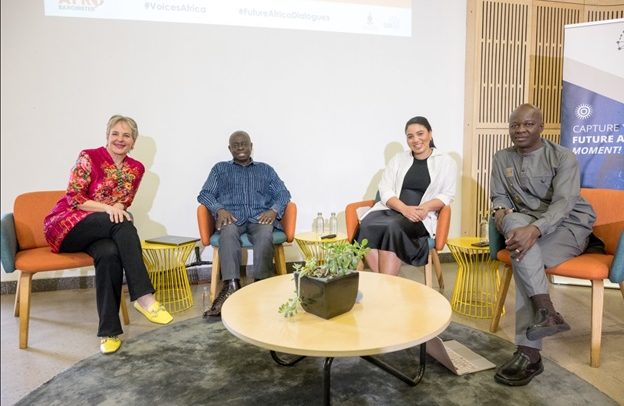Co-founder of Afrobarometer, Emmanuel Gyimah-Boadi (M) with panel members at the dialogue
The Co-founder and Board Chair of Afrobarometer, Emmanuel Gyimah-Boadi has stated that public-attitude surveys organized by the research platform have revealed that ordinary Africans have the agency and ability to voice their opinions, regardless of the narratives pushed by experts and pundits.
According to the co-founder the survey, which was done in partnership with Future Africa, has helped turn down doubts raised by some experts concerning the acceptance of democracy within the continent and proved that Africans are accepting towards the democratic system of ruling.
“Our work decisively refuted the doubts raised by sceptical reviewers of our initial funding proposal, proving them unequivocally wrong,” he said. “Moreover, we demonstrated that ordinary Africans have the agency and ability to voice their opinions, regardless of the narratives pushed by experts, pundits, and assorted elites,” he stated.
The survey conducted across 36 African countries between 2021 and 2022, which was organized by Afrobarometer in partnership with Future Africa, revealed that 66 per cent of the research population prefer democracy to any other system of government and reject non-democratic alternatives.
It showed that 80 per cent of the population reject one man rule, 78 per cent reject one-party rule, and 67 per cent reject military rule.
The findings also indicated that Africans strongly support norms, institutions, and practices associated with democratic governance, with 75 per cent of the population supporting the selection of political leaders through the ballot box, 74 per cent supporting the placing of constitutional limits on presidential tenure, 64 per cent supporting multiparty competition, 65 per cent supporting free media, and 61 per cent supporting the holding governments accountable.
Afrobarometer Digital Portfolio Manager, Shannon van Wyk-Khosa, however noted that there is a great disillusionment between the youth and those who govern them.
“Generally, we see that lots of African youth feel they are not being listened to by their governments. Compared to their elders, the youth are even more critical of institutional corruption and show considerable distrust in public institutions.
They are also more likely than their elders (by 10 percentage points compared to those over age 55) to express a willingness to tolerate military intervention if elected leaders abuse their power,” she stated.
This information was shared in a dialogue hosted by Future Africa at the University of Pretoria.
The event forms part of Afrobarometer’s Dialogue Series, which aims to stimulate bold ideas and disruptive thinking on how science can make a difference to real-world problems and how best to enable it.
The partnership between Afrobarometer and Future Africa aims to strengthen collaboration between the two institutions through capacity building workshops, seminars, and the co-development of training materials to introduce students to the collection, analysis, and communication of public opinion data.
By Abigail Atinuke Seyram Adeyemi


